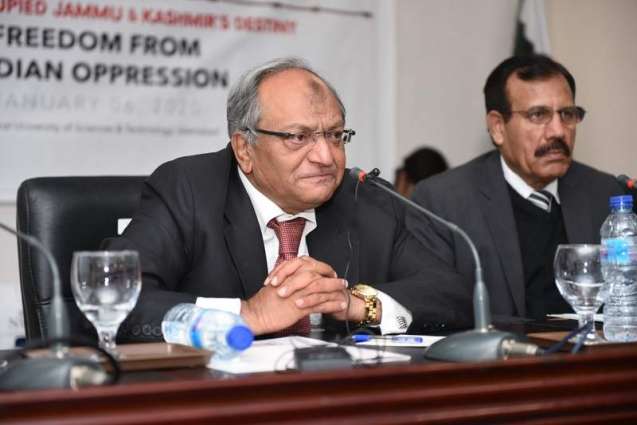With a view to commemorating the Right to Self-Determination Day, observed worldwide by Kashmiris on January 5, and to expressing solidarity with them, NUST Institute of Policy Studies (NIPS) organised a seminar on “Indian-Occupied Kashmir’s Destiny: Freedom from Indian Oppression,” at the university’s main campus
Islamabad (Pakistan Point News - 07th January, 2020) With a view to commemorating the Right to Self-Determination Day, observed worldwide by Kashmiris on January 5, and to expressing solidarity with them, NUST Institute of Policy Studies (NIPS) organised a seminar on “Indian-Occupied Kashmir’s Destiny: Freedom from Indian Oppression,” at the university’s main campus. The seminar aimed at bringing forth some of the key aspects of Kashmir issue and the trajectory that it may witness in the future.
In his opening remarks, Pro-Rector NUST, Maj Gen Jahangir Khan (Retd), emphasised that this year’s commemoration of Kashmiris’ inalienable right to self-determination highlighted the terrible fact that India’s oppression of Kashmiris had increased manifold in the wake of the inhuman lockdown and siege of millions of Kashmiris that followed India’s dastardly revocation of Article 370 of its own constitution. He said this fundamentally illegal Indian attempt at annexation violated not only the UN resolutions but also served to highlight the fact that the Indian-Occupied Jammu & Kashmir was a disputed region calling for urgent and just resolution.
Mr Afrasiab Mehdi Hashmi Qureshi, former Ambassador of Pakistan to Bangladesh, Bhutan and New Zealand, and author of several books on foreign policy, posited that India has changed from a secular to an irreversible ideologically fascist country. Given his experience as a career diplomat, Ambassador Qureshi positioned the Kashmir case against the backdrop of the cumulative absorption of Hindutva doctrine into the Indian force posture and brutalities in Kashmir.
Mr Ahmer Bilal Soofi, an eminent legal expert and former federal caretaker minister for Law and Justice, Parliamentary Affairs and Human Rights, reflected significant facets of the UN resolutions and prospects of a peaceful resolution of Kashmir issue. He said that this case is unique as the UN Charter of 1945 had marked the finality of states’ borders, thus the limitations of self-determination. Mr Ali Shah, Head of Research at NIPS, highlighted the need for Pakistan to achieve speedy and comprehensive development so that the overall conducive environment could be created in which the sustainable resolution of Kashmir dispute would be sought. The event was moderated by Dr Ashfaque Hasan Khan, DG NIPS and Principal School of Social Sciences & Humanities, NUST, and was attended by scholars, Government officials, Ambassadors, media persons, NUST faculty and students.




